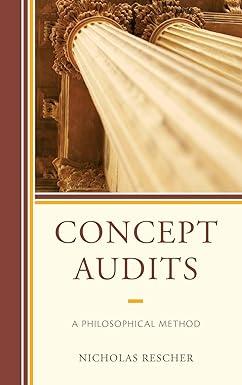Question
Milanese Corporation manufactures one product. It does not maintain any beginning or ending Work in Process inventories. The company uses a standard cost system in
Milanese Corporation manufactures one product. It does not maintain any beginning or ending Work in Process inventories. The company uses a standard cost system in which inventories are recorded at their standard costs and any variances are closed directly to Cost of Goods Sold. There is no variable manufacturing overhead. The companys balance sheet at the beginning of the year was as follows:
| Milanese Corporation | ||
| Balance Sheet | ||
| January 1 | ||
| Assets | ||
| Cash | $ | 1,091,150 |
| Raw materials inventory | 25,100 | |
| Finished goods inventory | 79,760 | |
| Property, plant, and equipment (net) | 652,730 | |
| Total assets | $ | 1,848,740 |
| Liabilities and Equity | ||
| Retained earnings | $ | 1,848,740 |
| Total liabilities and equity | $ | 1,848,740 |
The standard cost card for the companys only product is as follows:
| Inputs | Standard Quantity or Hours | Standard Price or Rate | Standard Cost | |||||
| Direct materials | 1.70 | gallons | $ | 4.00 | per gallons | $ | 6.80 | |
| Direct labor | 0.50 | hours | $ | 20.00 | per hour | 10.00 | ||
| Fixed manufacturing overhead | 0.50 | hours | $ | 16.40 | per hour | 8.20 | ||
| Total standard cost per unit | $ | 25.00 | ||||||
The standard fixed manufacturing overhead rate was based on budgeted fixed manufacturing overhead of $164,000 and budgeted activity of 10,000 hours.
During the year, the company completed the following transactions:
- Purchased 34,400 gallons of raw material at a price of $4.90 per gallon.
- Used 30,360 gallons of the raw material to produce 17,800 units of work in process.
- Assigned direct labor costs to work in process. The direct labor workers (who were paid in cash) worked 9,300 hours at an average cost of $20.40 per hour.
- Applied fixed overhead to the 17,800 units in work in process inventory using the predetermined overhead rate multiplied by the number of direct labor-hours allowed. Actual fixed overhead costs for the year were $174,600. Of this total, $122,840 related to items such as insurance, utilities, and indirect labor salaries that were all paid in cash and $51,760 related to depreciation of manufacturing equipment.
- Transferred 17,800 units from work in process to finished goods.
- Sold for cash 17,700 units to customers at a price of $48.00 per unit.
- Completed and transferred the standard cost associated with the 17,700 units sold from finished goods to cost of goods sold.
- Paid $53,560 of selling and administrative expenses.
- Closed all standard cost variances to cost of goods sold.
Required:
1. Compute all direct materials, direct labor, and fixed overhead variances for the year.
2. Enter the beginning balances and record the above transactions in the worksheet that appears below. Because of the width of the worksheet, it is in two parts. In your text, these two parts would be joined side-by-side to make one very wide worksheet and Determine the ending balance (e.g., 12/31 balance) in each account. (Input all your answers as a positive value.)
Step by Step Solution
There are 3 Steps involved in it
Step: 1

Get Instant Access to Expert-Tailored Solutions
See step-by-step solutions with expert insights and AI powered tools for academic success
Step: 2

Step: 3

Ace Your Homework with AI
Get the answers you need in no time with our AI-driven, step-by-step assistance
Get Started


